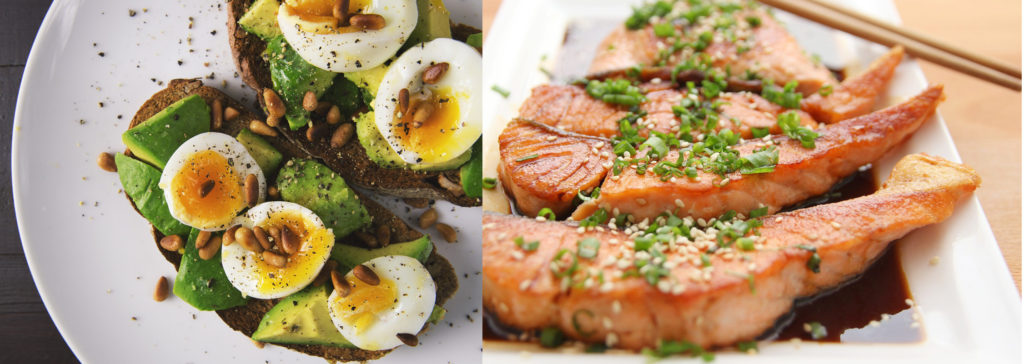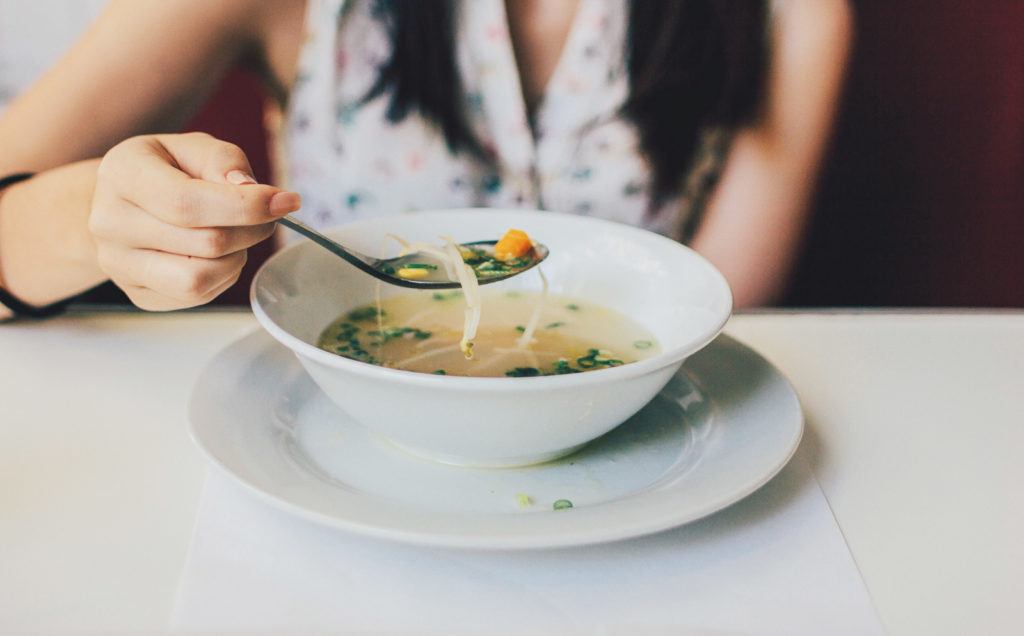
The ketogenic diet is a low carb, moderate protein, and high fat diet which puts the body into a metabolic state known as ketosis.
When you’re body is in a state of ketosis, the liver produced ketones which become the main energy source for the body.
What Happens When you Eat Carbs?
When you eat something high in carbs, your body will produce glucose and insulin.
- Glucose is the easiest molecule for your body to convert and use as energy so that it will be chosen over any other energy source.
- Insulin is produced to process the glucose in your bloodstream by taking it around the body.
Since the glucose is being used as a primary energy, your fats are not needed and are therefore stored. Typically on a normal, higher carbohydrate diet, the body will use glucose as the main form of energy. By lowering the intake of carbs, the body is induced into a state known as ketosis.
Ketosis is a natural process the body initiates to help us survive when food intake is low. During this state, we produce ketones, which are produced from the breakdown of fats in the liver.
The result is that your body becomes incredibly efficient at burning fat for energy. It also turns fat into ketones in the liver, which can supply energy for the brain.
Ketogenic diets can cause significant reductions in blood sugar and insulin levels. This, along with the increased ketones, has numerous health benefits.
Benefits of the Ketogenic Diet
Studies have shown that those who eat a low carb, high fat diet rather than a high carb, low fat diet:
- Lose more weight and body fat
- Have better levels of good cholesterol (HDL and large LDL)
- Have reduced blood sugar and insulin resistance (commonly reversing prediabetes and type 2 diabetes)
- Have better energy levels
- Experience a decrease in appetite
- Have reduced triglyceride levels (fat molecules in the blood that cause heart disease)
- Have significant reductions in blood pressure, leading to a reduction in heart disease and stroke
The ketogenic diet has been successfull in treating many conditions such as epilepsy, Parkinson’s disease and Alzheimer’s. It has also shown to be beneficial for individuals suffering from Acne.
Longer satiation and consistent energy levels are due to the majority of calories coming from fat, which is slower to digest and calorically denser.Being on a low carb diet also eliminates blood glucose spikes and crashes. You won’t have sudden blood sugar drops leaving you feeling weak and disoriented.

What Foods to eat on the Ketogenic Diet
- Meat: Red meat, steak, ham, sausage, bacon, chicken and turkey.
- Fatty fish: Such as salmon, trout, tuna and mackerel.
- Eggs: Look for pastured or omega-3 whole eggs.
- Butter and cream: Look for grass-fed when possible.
- Cheese: Unprocessed cheese (cheddar, goat, cream, blue or mozzarella).
- Nuts and seeds: Almonds, walnuts, flaxseeds, pumpkin seeds, chia seeds, etc.
- Healthy oils: Primarily extra virgin olive oil, coconut oil and avocado oil.
- Avocados: Whole avocados or freshly made guacamole.
- Low-carb veggies: Most green veggies, tomatoes, onions, peppers, etc.
- Condiments: You can use salt, pepper and various healthy herbs and spices.
What Foods to AVOID on the Ketogenic Diet
- Sugary foods: Soda, fruit juice, smoothies, cake, ice cream, candy, etc.
- Grains or starches: Wheat-based products, rice, pasta, cereal, etc.
- Fruit: All fruit, except small portions of berries like strawberries.
- Beans or legumes: Peas, kidney beans, lentils, chickpeas, etc.
- Root vegetables and tubers: Potatoes, sweet potatoes, carrots, parsnips, etc.
- Low-fat or diet products: These are highly processed and often high in carbs.
- Some condiments or sauces: These often contain sugar and unhealthy fat.
- Unhealthy fat: Limit your intake of processed vegetable oils, mayonnaise, etc.
- Alcohol: Due to its carb content, many alcoholic beverages can throw you out of ketosis.
- Sugar-free diet foods: These are often high in sugar alcohols, which can affect ketone levels in some cases. These foods also tend to be highly processed.
Side Effects of the Keto Diet
Although the ketogenic diet is safe for healthy people, there may be some initial side effects while your body adapts. This is often referred to as “keto flu” and can include reduced energy, nausea, fatigue, headaches, cough, sleep issues, digestive discomfort and irritability.
In order to minimize this, start slowly – you can try a regular low-carb diet for the first few weeks. This may teach your body to burn more fat before you completely eliminate carbs.
A ketogenic diet can also change the water and mineral balance of your body, so adding extra salt to your meals or taking mineral supplements can help. (you could have salty foods such as soup broth or pickles)
For minerals, try taking 3,000–4,000 mg of sodium, 1,000 mg of potassium and 300 mg of magnesium per day to minimize side effects.

